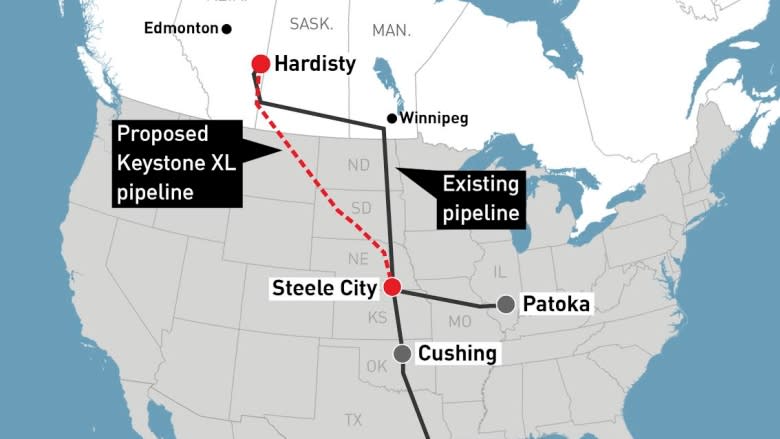Nebraska OKs 'alternative route' for Keystone XL pipeline

TransCanada Corp.'s Keystone XL pipeline won approval Monday from regulators in Nebraska, but state regulators did not OK the company's preferred route.
Instead, the commission approved the so-called "mainline alternative route" for the pipeline, which is a slightly different path from the preferred route proposed by TransCanada. Pipeline opponents were cheered by the result.
As approved, the pipeline would run farther northeast than was originally proposed.
During a brief meeting held in Lincoln, Neb., the state's five-member Public Service Commission voted 3-2 in favour of the proposed $10-billion, 1,900-kilometre pipeline. The commission had been charged with deciding whether the project was in the state's interest. Nebraska was the last state along the route to give its approval to Keystone XL.
The commission said in its decision that the alternative route was only eight kilometres longer than the preferred route, and that the company had said it was still a viable and beneficial route.
TransCanada's top executive said the company is weighing the decision.
"As a result of today's decision, we will conduct a careful review of the Public Service Commission's ruling while assessing how the decision would impact the cost and schedule of the project," Russ Girling, TransCanada's chief executive officer, said in a release.
In Canada, federal and provincial politicians welcomed Nebraska's decision
"This is another step in our broader effort to bring more Alberta oil to the world, diversify our markets and maximize the value we as Albertans get," said Alberta Premier Rachel Notley in a release. "Today, U.S. decision makers carefully considered a pipeline and granted an approval."
Federal Natural Resources Minister Jim Carr said the pipeline will create thousands of good jobs for Canadians during construction, mostly in Alberta, while strengthening the Canadian resource industry.
"The project also bolsters North American energy security and economic competitiveness," Carr said.
Opponents encouraged by route change
However, opponents of the pipeline hailed the regulatory decision not to grant TransCanada the right to construct the pipeline along the company's preferred route.
"We're incredibly encouraged that the PSC denied the route that TransCanada wanted through Nebraska," Brian Jorde, a lawyer representing landowners opposed to the pipeline, told CBC News.
Jorde said roughly 40 per cent of his existing clients would still be in the path of the mainline alternative route, while another 60 per cent would be new landowners who did not have the opportunity to speak at earlier hearings on the project.
Intervenors can appeal
"We are disappointed that the commissioners approved Keystone XL, and have chosen to place the route through the most fragile soils and over and through the Ogallala Aquifer — refusing to see the value of our natural resources," Art Tanderup, a farmer on the Keystone XL pipeline route near Neligh, Neb., said in a release.
Intervenors in the case now have the option to file an appeal in the Nebraska courts within 30 days of portions of the PSC's decision. Intervenor parties may also petition the PSC for a rehearing within 10 days of the decision.
Commissioner Crystal Rhoades, one of the two who voted against approval, gave several reasons for her vote, saying during the meeting that about 40 landowners may not even know they are impacted by the path of the proposed pipeline. She also questioned whether the project will lead to jobs for Nebraskans.
No other commissioners offered reasons during the meeting for their decision.
"Nebraska opted not to give TransCanada its preferred route through the state, so the company now has more hurdles in front of its beleaguered pipeline," Greenpeace Canada climate and energy campaigner Mike Hudema said in a statement.
Designed to transport about 830,000 barrels of oil a day from Hardisty, Alta.,Keystone XL would cross parts of Montana, South Dakota and most of Nebraska.
The proposed pipeline would expand on the existing Keystone system, which runs through North Dakota, South Dakota, Nebraska, Kansas, Oklahoma, Texas and into Missouri and Illinois. Keystone XL would link to the the existing Keystone line at Steele City, Neb.
Meant to link Canada's oilsands to U.S. refineries, the Keystone XL project has been a lightning rod of controversy since it was proposed nearly a decade ago.
While he was in office, U.S. President Barack Obama rejected Keystone XL in 2015 after years of review, only for President Donald Trump to give the go-ahead to the project in March, saying the pipeline will bring jobs and reduce dependence on foreign oil.
Monday's decision came just days after a 5,000-barrel oil spill from the existing Keystone pipeline in South Dakota. Crews were working to clean up the spill.
The Nebraska Public Service Commission was prohibited from evaluating safety considerations, including risk or impact of a spill, and ruled instead on issues including regulatory compliance, economic and social impacts of the project, the potential intrusion on natural resources, and whether better routes exist.
- FIFTH ESTATE How groups pumped millions into Keystone

 Yahoo Finance
Yahoo Finance 